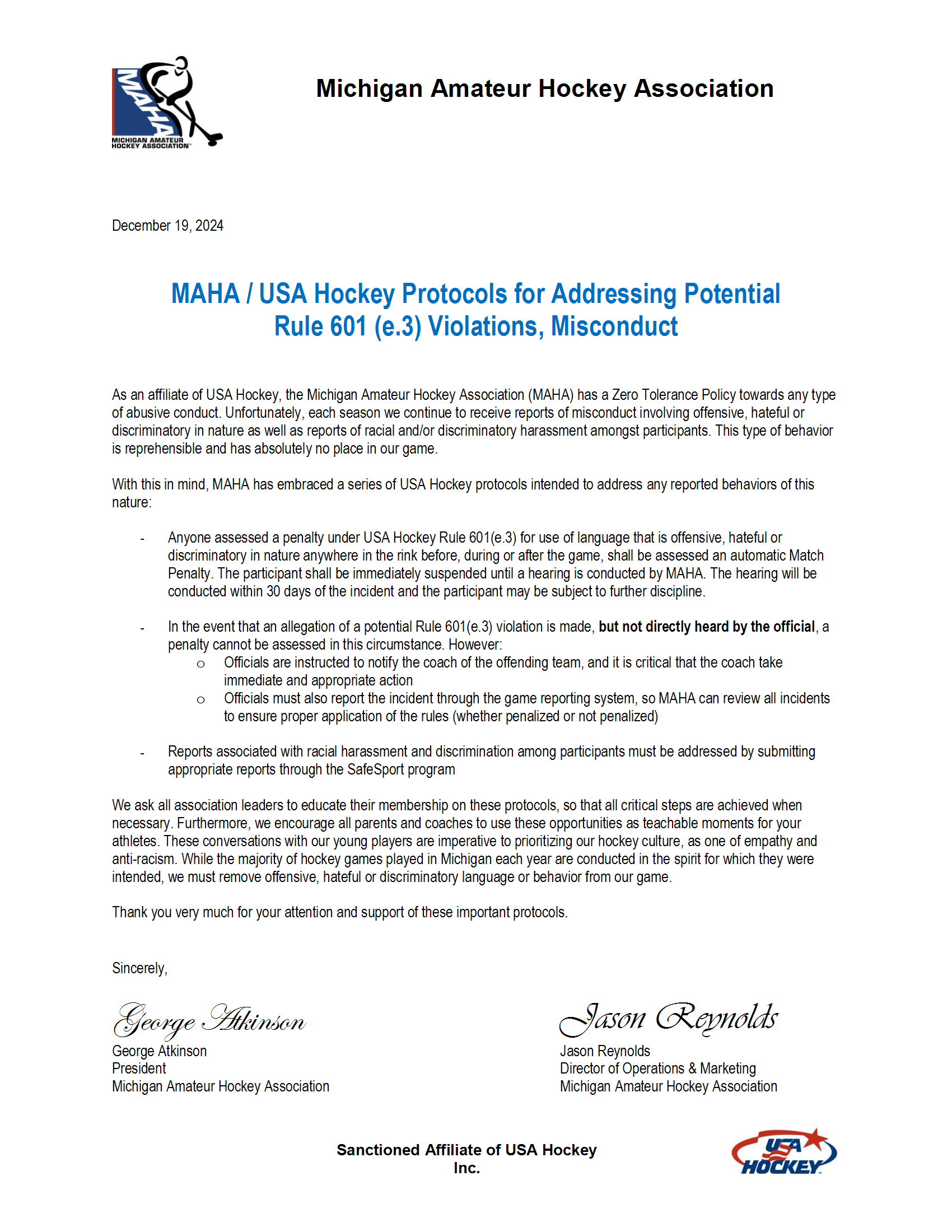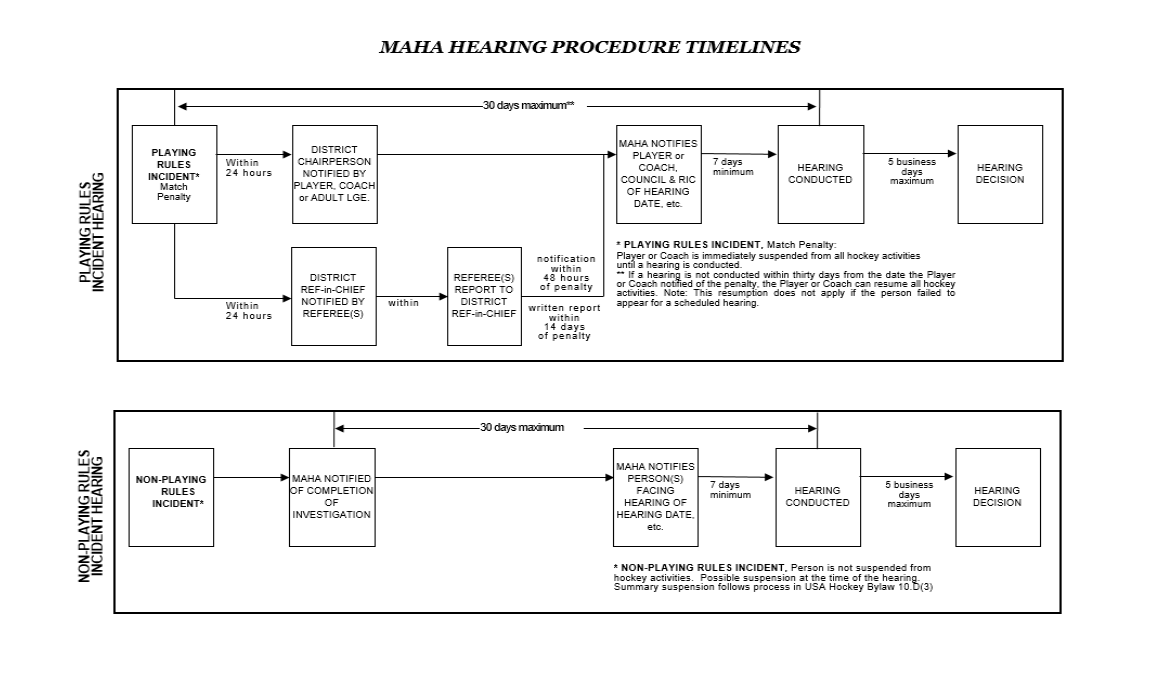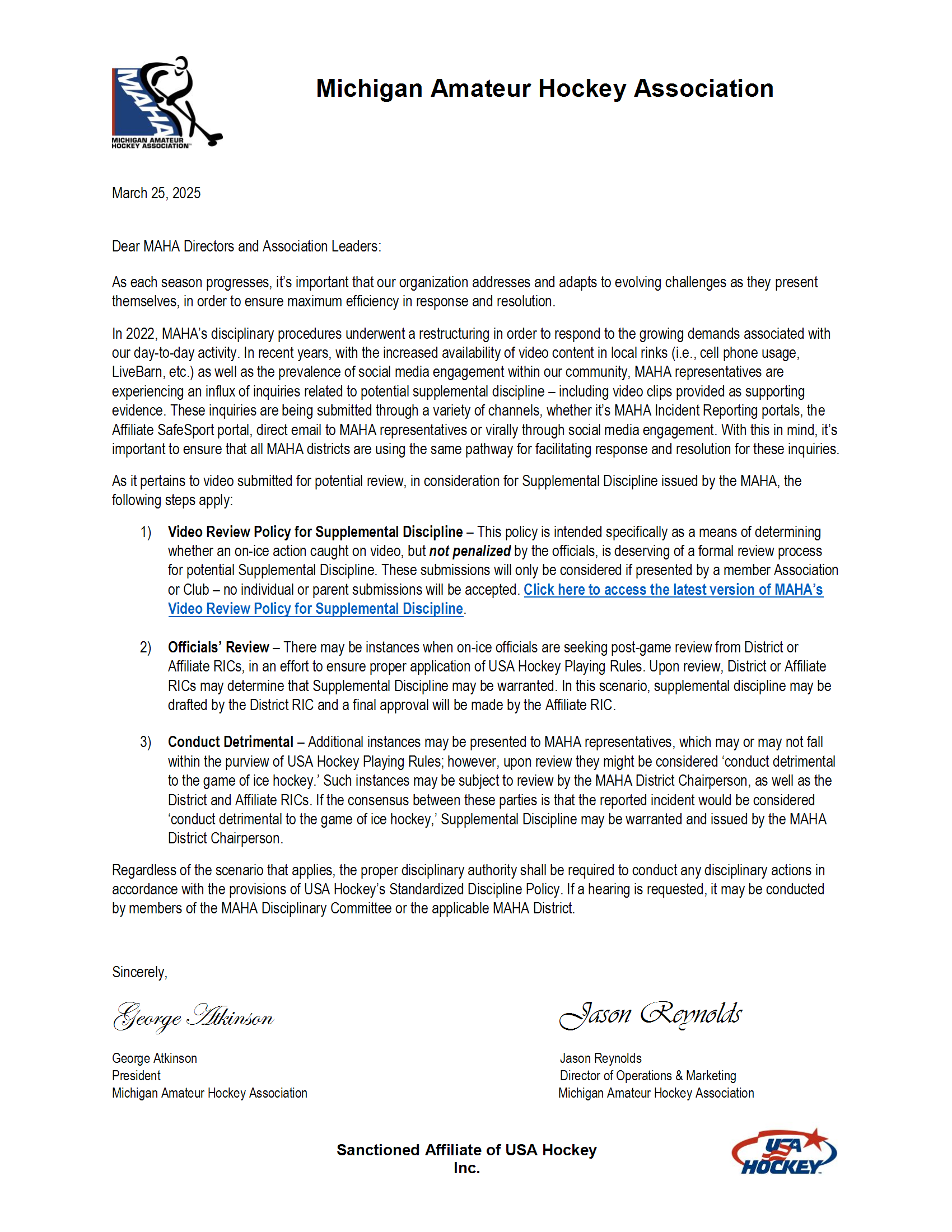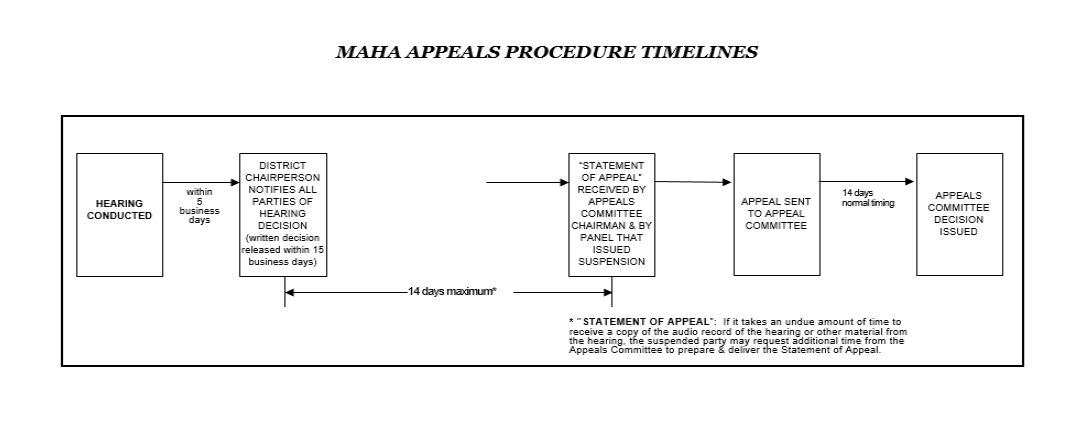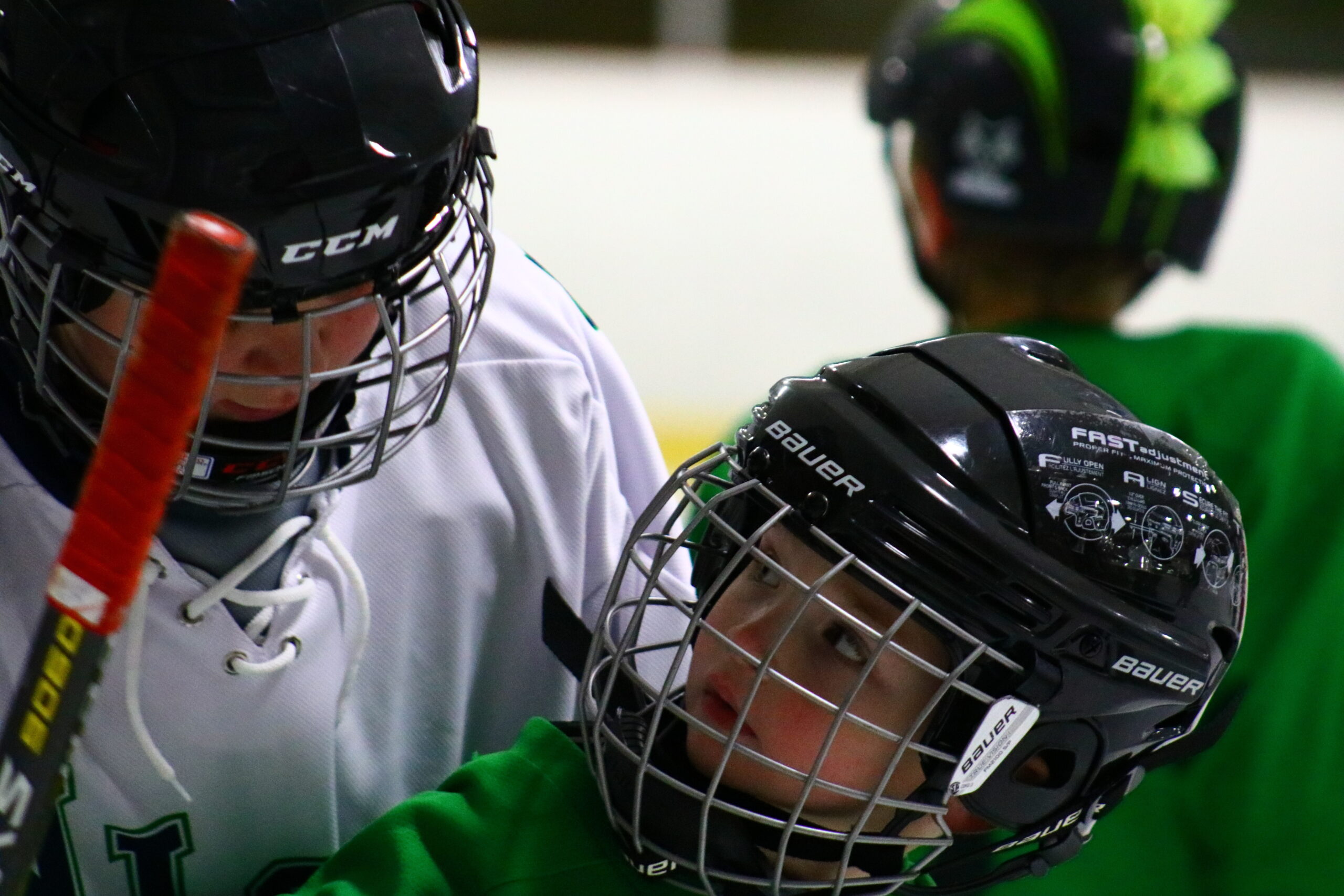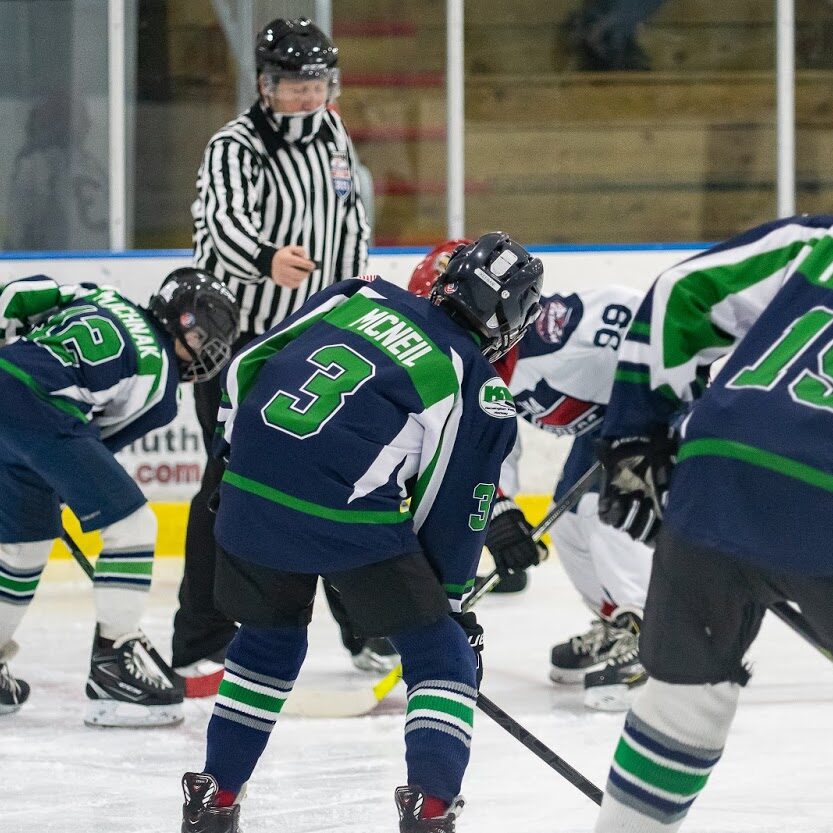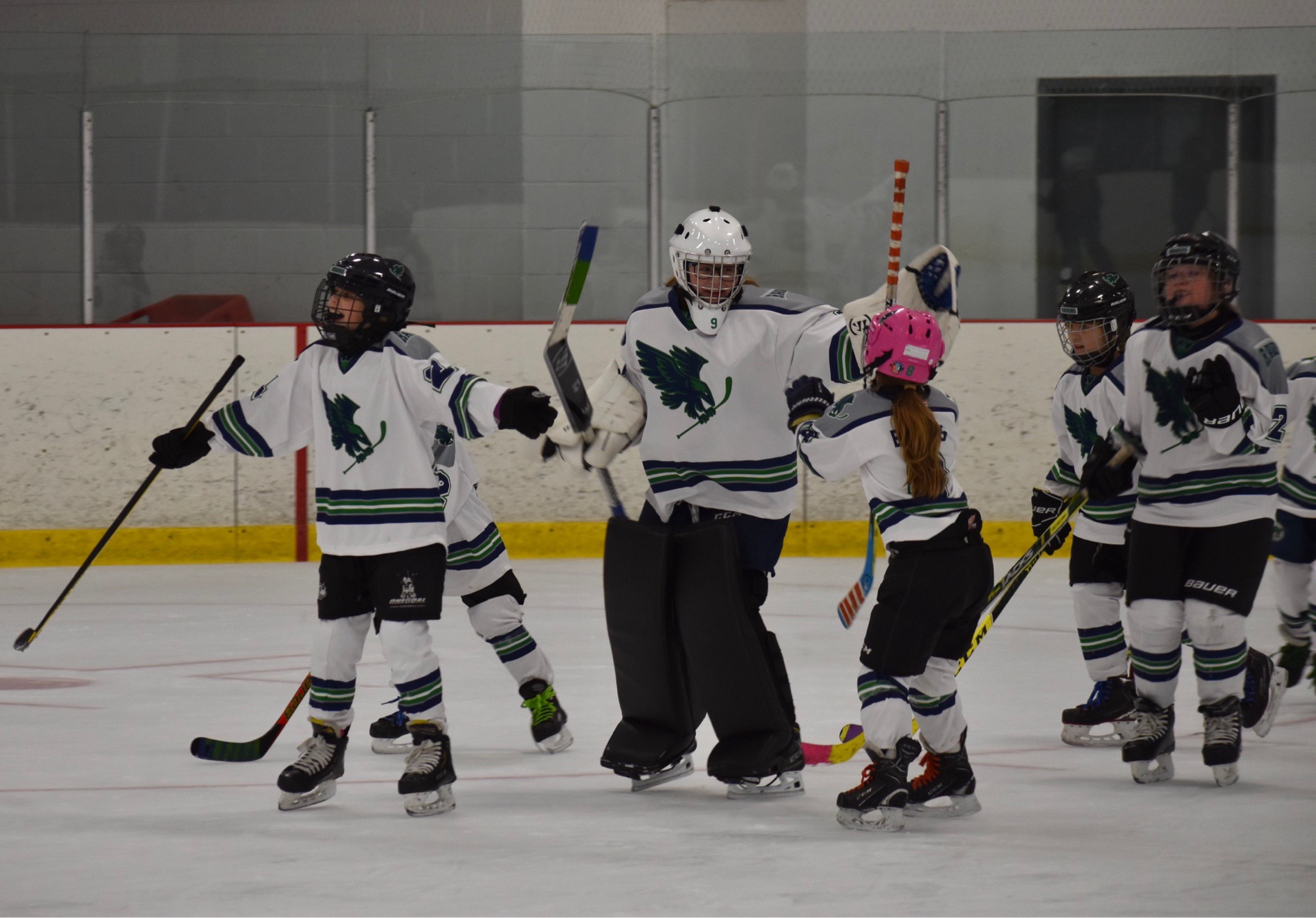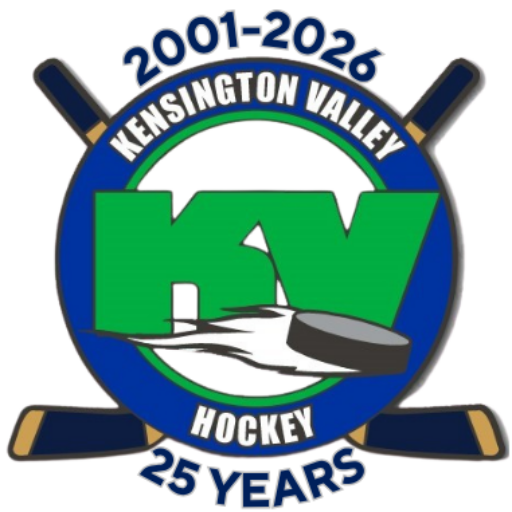This page outlines what to do if you or someone on your team receives a Game Misconduct or Match Penalty as well as information related to hearings and an outline of penalties and rules.
GAME MISCONDUCT & MATCH PENALTIES
Be sure to check the Game Sheet after every game to ensure that all penalties are properly recorded and there are no game misconducts or match penalties, or any penalties incorrectly coded before submitting the game. These are more easily resolved at the time of the game rather than after so please take a moment to review.
If a player and/or a coach receives a GAME MISCONDUCT penalty, the player must serve the next scheduled game on your team's calendar. If a game is assessed during a District game, the player must serve the next game plus the next district game, if the district game is not the next game (a total of two games).
After a MATCH PENALTY, the team needs to notify KVHA within 24 hours, who will then notify the MAHA District 4 Chair. Any player and/or a coach receiving a MATCH penalty is immediately suspended from all amateur hockey activities (including practices and off-ice team activities) until a decision is rendered under the standardized discipline policy or until a hearing is held by the District Council. Once the investigation is conducted and the discipline is assessed, the findings/results will be sent to the player/family, and they have a right to request a hearing or accept the disciplinary action assessed.
Be sure to note clearly on every Game Sheet the player (name & number) or coach is serving the game misconduct from (date of the game when they were assessed). Teams will be required to print copies of scoresheets from Gamesheets to show the player or coach served the games.
A coach or manager who knowingly allows participation of an ineligible player or coach in a game shall be subject to a recommended suspension of not less than one year. A player, who knowingly participates in a game as an ineligible player, shall be suspended for not less than thirty (30) days. Not sitting out the next game, and noting that on the scoresheet, will constitute allowing the participation of an ineligible player or coach.
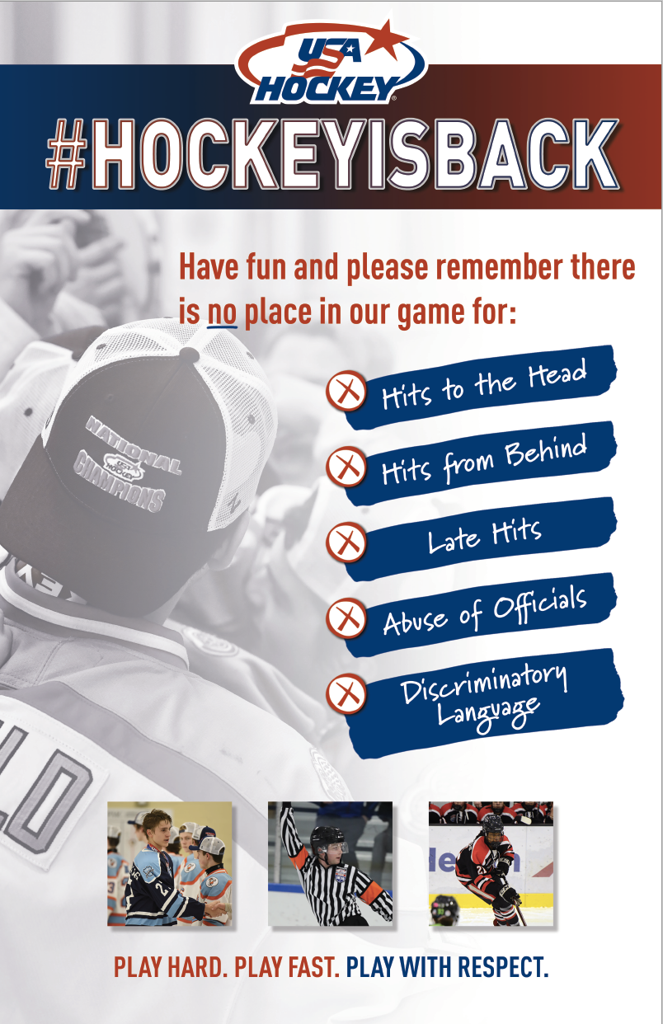
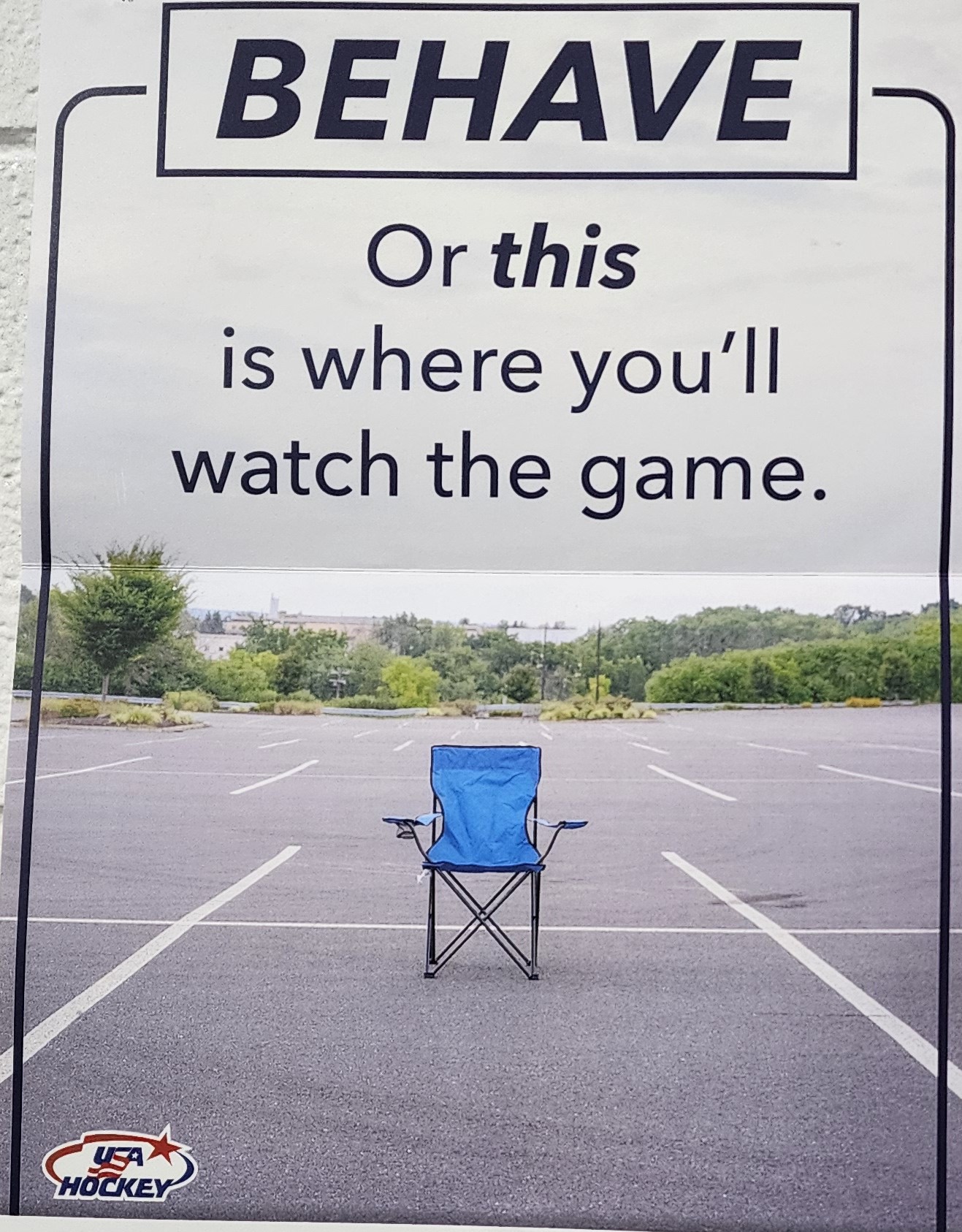
Conduct “detrimental to hockey”: Any conduct that is not in the best interest of promoting the mission and purposes of amateur hockey, that is brought to the attention of the MAHA District Council, will be investigated. A subsequent hearing will be conducted if warranted by the information gathered during the investigation. (Reference M.A.H.A. Annual Guide: section XVI, Disciplinary Actions.)
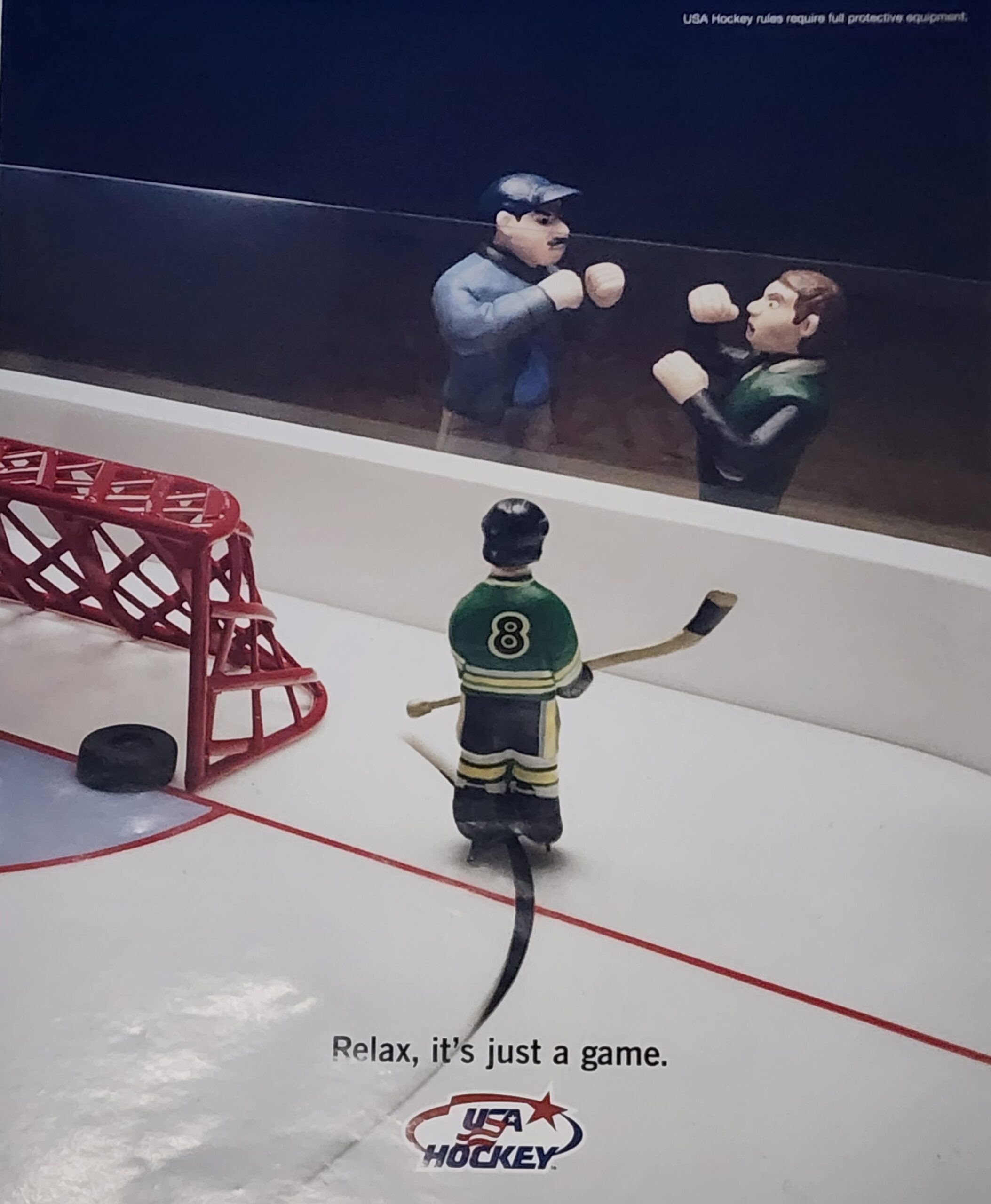
fficials do have the opportunity to amend an original penalty within a reasonable time frame from the original occurrence. It would fall under supplemental discipline. In some cases, referees check with the referee in chief to see if they gave the appropriate penalty. In some cases, if an official later learns that a player sustained an injury, they may assess a match penalty after a game misconduct has been called.
Suspensions
Hopefully you will never need to refer to the information in this section. However, if circumstances arrive where you do receive a Match penalty or are suspended, here is a brief over view of the process. For more in depth information refer to the MAHA Rules and Regulations Section XVI and USA Hockey Bylaw 10.
Overview of Suspension & Hearing Process
- If a player or coach receives a Match Penalty during a game, the Head Coach of that team is responsible to contact his/her District Chairperson with 24 hours to report the infraction.
- The affected District Council Chairperson (or designate) shall then gather the report, contact witnesses, investigate the situation if needed and schedule and conduct a hearing within thirty (30) days.
- The District Council Chairperson (or designate) shall provide at least seven (7) days written notice to all persons who are suspended, or subject to suspension, of the location and time of the hearing.
- If the person(s) under suspension or facing suspension refuses to attend or fails to appear at a scheduled hearing, they will be indefinitely suspended until they appear before a scheduled Hearing Panel.
- The Hearing Panel is to include a minimum of three (3) persons, one of whom is a MAHA Director, and must be reasonably disinterested and impartial.
- At the discretion of the Hearing Panel, the hearing may be open to interested parties not involved
- The Hearing Panel may hear any evidence that it believes is relevant to the issue(s) at hand. It may place limits on time, evidence and documentation (but relatively equal time to each side of the issue). It may have witnesses and/or written statements. Note that the Rules of Evidence in Judicial Proceedings shall not apply to the hearing. The “Burden of Proof” is that the charges are more likely true than not true, otherwise referred to as “preponderance of evidence” standard.
- The Hearing Panel shall use reasonable efforts to render its decision to the parties to the hearing within five (5) business days of the close of the hearing.
From the MAHA Annual Guide pages 55-56
XII. DISCIPLINARY ACTIONS for Players, team officials, leagues, or others (except referees)
1. Hearings on all matters of suspension shall be conducted in the District in which the penalized player, coach, or team official was registered on the date the penalty was called. Upon receipt of notification of an incident involving possible or automatic suspension under these Rules or the USA Hockey playing rules for match penalties, a hearing shall be held in accordance with the rules of USA Hockey Bylaw 10 regarding suspensions and appeals. The Presiding Officer shall have the authority to appoint a temporary third member in the event of the unavailability of any member of the District Council. For the purposes of this Paragraph all “amateur hockey activities” shall include coaching, playing, refereeing and off-ice officiating at games or practices.
2. All match penalties must be reported by both the Referee and the Head Coach or League Director in place of Head Coach for Adult Leagues.
a. Within 24 Hours:
i. Referee must report penalty to his/her District Referee-in-Chief by phone or electronic device. The referee must also submit an official game report via the game report website.
ii. Head Coach must report the penalty, within 24 hours following the incident by phone or electronic device to the District Council Chairperson where the player or team official is rostered.
iii. For Adult Leagues, the League Director must report the penalty including the player’s
complete name, address, phone, and email to the District Chair by phone or electronic
device.
b. Within 48 Hours:
i. Referee must send an electronic copy of the original score sheet to the District Referee-in-Chief and the District Chairperson.
ii. Referee must send the original score sheet to the District Chairperson of the affected district.
iii. Referee must keep a copy of both the score sheet and game report for their records.
c. If the District Council Chairperson is unavailable, it shall be reported to another District Council Director in the proper District; (see list of District Directors and list of District Supervisor of Officials, MAHA Annual Guide).
d. The reporting referee shall personally attend or be represented at any hearing held concerning the penalty. Failure to comply may result in disciplinary action.
e. Violations of these rules may result in the suspension of the offending player, team official, or referee.
3. Any team that leaves the ice during the game in dispute of a registered referee’s decision shall forfeit the game by a 1-0score (regardless of the score at the time). The coach and/or manager of the team leaving the ice, shall be assessed a match penalty and be subject to a recommended suspension of not less than one year.
4. A player or team official receiving a match penalty is automatically suspended from all amateur hockey activities until a hearing is held by the District Council.
5. If, as a result of a hearing, the allegation of deliberate assault on a game official (referee, linesman, official scorekeepers, game timekeepers, penalty timekeepers, goal judges, statisticians, and public address announcers) is sustained, the player or team official shall be suspended for a minimum period of one (1) year, followed by probation for a period to bedetermined by the District Council.
6. All complaints of vandalism or destruction of public or private property by any player or team staff member shall be referred to their home District Council for disposition. If the home District Council finds that such vandalism or destruction was caused, it shall have the power to suspend players for a recommended minimum of one (1) year and staff members of the team for a recommended minimum of five (5) years. The District Council may, as a condition precedent or reinstatement of a player or staff member, require him or her to make reasonable restitution to the damaged property owner.
7. When a player, coach or manager receives a game suspension(s), he/she shall not be eligible to participate in the next game(s) that were already on the schedule of that team before the incident occurred.
8. The head coach of any team accumulating twelve (12) or more penalties during the same game, will automatically be suspended for the next game his/her team plays (USA Hockey - 404 misconduct penalties).If the head coach is not present at all during the game in which the team accumulates the twelve (12) or more penalties, the person on the bench responsible for the team (i.e.: who signed the score sheet prior to the start of the game) will be assessed the suspension.
9. A player who receives a game misconduct penalty will be suspended for one game. Upon receipt of a game misconduct, the player must immediately proceed to the locker room andeither: a) remain in the locker room for the balance of the game, or b) dress and leave the arena premises.
10. The MAHA District Councils shall have the power to suspend any member for conduct detrimental to hockey either on or off the ice. Violation of the Bylaws, Rules and Regulations, and written policies of USA Hockey or The MAHA may result in disciplinary action.
11. Abusive or threatening words or action toward any Officer, Director, appointed Officer or Game Official of this Association, opposing Team Official, opposing player or spectator shall be considered ungentlemanly conduct and the District Council shall have the power to suspend such person(s) after conducting a hearing on such matter.
12. In order to preserve as far as possible, the integrity of amateur hockey, any recourse to the courts or legal action by a member or individual before all of the rights of the Bylaws and Rules and Regulations of this Association and USA Hockey shall have been exhausted, shall be ungentlemanly conduct entailing the immediate suspension and disqualification of any member or individual in accordance with USA Hockey Bylaw 10.
13. Any team personnel registered with another affiliate team of USA Hockey which plays in a Michigan League, receiving a match penalty in a game played in Michigan, is automatically suspended from all amateur hockey activities in Michigan, until a hearing is conducted in accordance with USA Hockey Bylaw 10. A. 3
14. Any disciplinary circumstance not elsewhere covered in these rules will be assigned by the President or by the Executive Committee to the proper District Council for a hearing. In circumstances where multiple Districts are involved, the Executive Committee may conduct he hearing.
15. Any suspension or other disciplinary action imposed as a result of a hearing may be appealed. See USA Hockey Bylaw 10.
16. Failure of the parent/legal guardian(s) of any registered player to comply with the MAHA S.T.A.R. Hockey Program Parent/Legal Guardian Code of Conduct shall become the disciplinary responsibility of the District Councils where the parent/legal guardian’s player is registered. District Council may refer matters back to the Association level when they deem appropriate. Upon resolution, all findings and actions are to be reported to the MAHA VP of Abuse & Appeals.
17. It is also highly recommended that the parent/legal guardian also view the MAHA S.T.A.R.Hockey Program video. This recommendation is especially important regarding parents who are new to the sport of ice hockey.
STANDARDIZED DISCIPLINE POLICY – MATCH PENALTIES
(Note) Any match assessed under Rule 601(e.1) (Physical Assault of Official) is excluded from this policy. Original jurisdiction in any hearing resulting from a match assessed under Rule 601(e.1) (Physical Assault of Official) shall reside with the Affiliate and is governed by USA Hockey’s “Resolutions of Disputes, Arbitration and Suspensions” section of the current USA Hockey Annual Guide.
When a match has been assessed, the official(s) will submit the required incident report to the as determined by the Affiliate. The as determined by the Affiliate will designate an individual who shall review the report and make a preliminary determination of one of the following:
1) The incident report is accurate and the proper application of the rule(s) has been implemented. The action warrants the suspension as outlined in the policy. The offending party is then notified of this finding and offered the opportunity to accept the suspension or reject the decision and request a hearing. If a hearing is requested, the hearing shall be offered in accordance Playing Rule 405(c) and with Bylaw 10D (Suspension Hearings/Domestic Competition Playing Rules). (Note) If the offending party requests a hearing under this section, the hearing body may, as a result of that hearing, reduce the suspension, maintain the suspension or increase the suspension imposed.
– or –
2) The incident report was determined to be inaccurate (misapplication of the rule(s) or wrong identified), in which case the matter shall be turned over to the as determined by the Affiliate for further review.
– or –
3) The incident report is accurate and the proper application of the rule(s) has been implemented. However, the action and/or history warrants further disciplinary review. The as determined by the Affiliate shall notify the offending party that a hearing shall be conducted in accordance with Playing Rule 405(c) and Bylaw 10D (Suspension Hearings/Domestic Competition Playing Rules).
In all instances where a or has been suspended for a period of time as a result of a match , the or shall be prohibited from participating in all USA Hockey activities for the length of the suspension. The required game(s) suspensions shall include the next regularly scheduled games that appear on the schedule of their team at the time of the incident. A or who is rostered on multiple USA Hockey registered teams must serve the suspension in full before they are permitted to participate on any other USA Hockey registered team, unless otherwise specified by the as determined by the Affiliate.
For the purpose of this policy, there shall be three levels of standardized suspension. They are:
Level 1 – Match penalties assessed under the below rules have a recommended range of a 6-10 game suspension.
Rule 305(b) Dangerous Equipment
Rule 601(e) Abuse of Officials and Other Misconduct (This includes all match penalties assessed under this rule except 601(e.1) Physical Assault of an Official)
Rule 602(a) Attempt to Injure or Recklessly Endanger an Opponent
Level 2 – Match penalties assessed under the below rules have a recommended range of a 4-8 game suspension.
Rule 603(c) Boarding
Rule 606(b)
Rule 607(e) Charging
Rule 608(c) Checking from Behind
Rule 619(b) Head Butting
Rule 620(c)
Rule 634(d) (Swinging Stick During )
Rule 635(b)
Level 3 – Match penalties assessed under the below rules have a recommended range of a 3-5 game suspension.
Rule 601(e.3) Abuse of Officials and Other Misconduct Hateful/Discriminatory Language
Rule 604(e) - Competitive Contact Category
Rule 609(c)
Rule 611(c) Elbowing
Rule 615(c) (Helmet Removal)
Rule 621(c) High Sticks
Rule 622(c) Holding an Opponent
Rule 623(c)
Rule 627(b) Kicking Opponent or Puck
Rule 628(c) Kneeing
Rule 633(a or b) Refusing to Start Play
Rule 634(c)
Rule 639(c) Tripping/Clipping/Leg Checking/Slew Footing
Rule 640(e) Unnecessary Roughness (Roughing)
https://www.usahockeyrulebook.com/page/show/6669971-standardized-discipline-policy-match-penalties
The Michigan Amateur Hockey Association (MAHA) is committed to ensuring the safety of participants at all ages and skill levels. With the increasing availability of video provided by rink-based programs and partners and parent or club-affiliated resources, we are entering a trial period of utilizing video review specifically as a means of determining whether an on-ice action caught on video, but not penalized by officials, is deserving of a formal review process for potential supplemental discipline. MAHA will NOT use video review for the purpose of changing any on-ice call.
Video submitted for potential review by MAHA will only be accepted/considered if presented by a member Association or Club (no individual or parent submissions will be accepted). This process shall be followed:
- Upon review by the Association or Club leadership, and determination that a request for further action is requested, the Association’s President or Club’s Manager must complete the “Video Review Request” form.
- Completed form must be sent to VPOfficials@MAHA.org. Form must be submitted with a $100 check. If the video is accepted and supplemental discipline is assessed, the check will be returned. If the video does NOT result in a hearing to determine additional discipline, the $100 check will be considered a fine to the organization that submitted the video.
- Upon receipt, the Vice President of Officials will review and determine if the actions shown on video warrants further review.
- If further review is deemed warranted, a review process will be undertaken by a Video Review Committee (the VR Committee).
- The VR Committee will make a recommendation to the MAHA Executive Vice President, who will make the final determination on conducting a supplemental discipline hearing.
- Supplemental Discipline will not be imposed unless and until a hearing has been conducted with the player, coach or parent that is the subject of the request.
- Discipline administered by MAHA will be imposed immediately and the subject of supplemental discipline will retain all appeal rights as provided for in the MAHA Guidebook and USA Hockey Bylaw 10. Any discipline assessed will not be delayed while an appeal is in process.
Additional Info: https://www.maha.org/miofficials
Link to file a review: https://maha.sportngin.com/register/form/044924831
Adopted 2019-20 Season
USA Hockey is committed to creating a safe and fair environment for all participants. Respect for the
game, the opponents, coaches and officials is a critical part of the environment that is created and it
covers several different aspects of sportsmanship and fair play. This initiative will encourage a change in
culture as to what is considered to be acceptable/unacceptable body checking and competitive contact
at all levels of play.
The following “points of emphasis” is not designed to replace our current rules/definitions, but instead
are intended clarify and update the existing rules/definitions to emphasize the key points to more clearly
outline what is deemed acceptable and unacceptable behavior. USA Hockey will also provide video
examples of these actions deemed “acceptable” and “unacceptable” to further illustrate expected
behavior. Please review the materials thoroughly so you can play a positive role in making our game safer.
COMPETITIVE CONTACT
Body “Competitive” Contact – Competitive contact is body contact between two or more skaters who are
in the immediate vicinity of the puck and who are in the normal process of playing the puck. These skaters
are reasonably allowed to lean into each other provided possession of the puck remains the sole object
of the contact. Body “Competitive” Contact is encouraged at all age classifications of play within USA
Hockey and provides the foundation for the skills necessary to advance to Body Checking classifications.
Acceptable examples of Body “Competitive” Contact Include:
Angling is a legal defensive skill used to direct/control the puck carrier to an area that closes the gap and
creates an opening that is too small for the puck carrier.
Physical Engagement is when two players who are in pursuit of the puck are allowed to reasonably lean
into each other provided that possession of the puck remains the sole objective of the two players.
Collisions occur when players are allowed to maintain their established position on the ice. A player shall
not be penalized if the intention is to play the puck and in so doing causes a collision with an opponent.
No player is required to move out of the way of an oncoming player to avoid an impact.
BODY CHECKING
A body check represents intentional physical contact, from the front, diagonally from the front or straight
from the side, by a skater to an opponent who is in control of the puck. The opposing player’s objective is
to gain possession of the puck with a legal body check and NOT to punish or intimidate an opponent.
Legitimate body checking must be done only with the trunk of the body (hips and shoulders) and must be
above the opponent’s knees and at or below the opponent’s shoulders. The use of the hands, forearm,
stick or elbow in delivering a body check is unacceptable and not within the guidelines of a legal body
check.
The primary focus of a body check is to gain possession of the puck and proper body checking technique
starts with stick on puck, therefore the stick blade of the player delivering the check must be below the
knees.
USA Hockey reminds coaches and players that these requirements are the responsibility of the player
delivering the body check. Under no circumstance is it acceptable to deliver a body check to a vulnerable
or defenseless opponent, an opponent who is not in possession and control of the puck or to use the
hands, stick, forearm or elbow in delivering a check to an opponent.Vulnerable or Defenseless – A skater is considered to be in a vulnerable or defenseless position when the
player is unaware, unprepared, or unsuspecting of an impending hit.
Infractions that occur as a result of a body check delivered to a vulnerable or defenseless player must be
penalized under the Boarding, Charging, Checking from Behind or Head Contact Rules. When done in a
dangerous, careless or reckless (unacceptable) manner where the player delivering the check has made
no effort to play the puck, the major plus game misconduct or match penalty provisions of these rules
must be assessed.
When two or more players are physically engaged for control of the puck along the boards, they are
considered to be vulnerable and defenseless. Any body check delivered by a skater to an opponent who
is physically engaged with another skater is considered dangerous, careless or reckless (unacceptable)
and must be penalized accordingly.
Late Avoidable Body Check – Any avoidable check delivered to a player who is no longer in control of the
puck. An avoidable check is when the player delivering the check has an opportunity to avoid contact or
minimize contact, once it is realized the opponent no longer has control of the puck.
The concept of “finishing the check” is an unacceptable action as it is one that is meant to intimidate or
punish the opponent with no intent to gain possession of the puck. The responsibility is on the player
delivering the check to avoid forceful contact (minimize impact) to a vulnerable or defenseless player
who is no longer in control of the puck.
BODY CONTACT CATEGORY
Non-check hockey does not mean no contact and the Body Contact Category game can be very physical.
USA Hockey strongly encourages legal body “competitive” contact to occur in all age classifications as
part of the skill progression that teaches legal body checking.
When determining whether a body check has occurred, the official must focus on whether the player is
attempting to play the puck and whether there is any overt hip, shoulder or forearm action used to initiate
contact and separate the opponent from the puck.
Legal body “competitive” contact occurs when players are focused on gaining possession of the puck and
are simply maintaining legally established body position. This most often occurs when two players are
physically engaged in front of the goal or along the boards.
Legal body “competitive” contact also commonly occurs when a player has established an angle on the
opponent and closes the gap to create an opening that is too small for the puck carrier. Additional
acceptable forms of body “competitive” contact include:
• A skater is entitled to the ice they occupy so long as they maintain their skating speed and body
position between an opponent and the loose puck.
• A skater is entitled to stand their ground and is not required to move if an opponent wishes to
skate through that area of the ice.
• A skater may block an opponent so long as they are in front of the opponent and moving in the
same direction.
• A skater can use their body position to force an opponent to take a less direct route to the puck,
so long as they do not use a hand or arm to hold or block the opponent.
BODY CHECKING CATEGORY
It is USA Hockey’s intent to create a safe environment for players to be able to develop their skills –
including body checking in age appropriate classifications – while also being able to physically compete
within the rules.
A player delivering a check to a vulnerable or defenseless player, who is not in control of the puck, will be
assessed a penalty for roughing. Officials are to pay particular attention to these examples when applying
this rule. These are intended as a guide and include, but are not limited to, the following:
• A player who is dangerous, careless or reckless (unacceptable) in delivering a check.
• A player who anticipates an opponent gaining possession or control of the puck but who makes
contact with the opponent before possession or control occurs.
• A player who delivers a late avoidable check to an opponent who has released a shot or pass and
is no longer in control of the puck.
• The use of the hands, forearm, stick or elbow in delivering a body check OR making contact with
the opponent after the whistle. If contact is made above the shoulders, this action must be
penalized as Head Contact. This includes any contact that occurs as part of a scrum situation
after play has been stopped.
• Two skaters who use competitive contact for position as they skate to a loose puck are within
their rights to do so, unless one uses theirstick, arm, or skates to obstruct their opponent’s ability
to skate to the puck.
UNSPORTSMANLIKE CONDUCT
A bench minor penalty for unsportsmanlike conduct shall be assessed to any team whose players or team
officials commit the following actions while on the players’ bench:
(5) Banging the boards with a stick or other object, including skates or arms, at any time, including after
a body check regardless as to whether the check is being penalized.
SUMMARY
All USA Hockey members must demonstrate awareness and support for the application, spirit and the
respect of the rules in order for continued improvement in the game of hockey.
Coaches are expected to teach proper skills and hold their players accountable for illegal and dangerous
actions, regardless as to whether they are properly penalized, or not.
Parents are expected to support the decisions of the officials and support the coaches in teaching the
proper skills in a safe and positive environment.
Officials shall enforce a strict penalty standard according to the guidelines that have been established.
Players are expected to compete within the playing rules.
Administrators are expected to hold players, coaches, officials and parents accountable for their actions
in an effort to promote a safe and positive environment for all participants.
All members of USA Hockey share an equal responsibility to ensure the integrity of the game is upheld.
The onus to incorporate change is not only on the officials, but also on administrators, coaches, parents
and players, as well
https://www.usahockey.com/declaration
USA Hockey is committed to creating a safe and fair environment for all participants. Respect for the game, the opponents, es and officials is a critical part of the environment that is created. This Zero Tolerance Policy summarizes required actions to be taken when violations occur.
All s, es, officials, s and administrators and parents/spectators are required to maintain a sportsmanlike and educational atmosphere before, during and after all USA Hockey sanctioned games. Thus, the following points of emphasis must be implemented by all USA Hockey participants and spectators.
Players
A minor for unsportsmanlike conduct (zero tolerance) shall be assessed whenever a :
1) Openly disputes or argues any decision by an official.
2) Taunts or incites an opponent.
3) Visually creates a disturbance during the game.
Any time that a persists in any of these actions, they shall be assessed a misconduct . A game misconduct shall result if the continues such action.
Coaches
A minor for unsportsmanlike conduct (zero tolerance) shall be assessed whenever a :
1) Openly disputes or argues any decision by an official.
2) Uses obscene, profane or abusive language to anyone at any time.
3) Visually displays any sign of dissatisfaction with an official’s decision including standing on the boards or standing in the bench doorway with the intent of inciting the officials, s or spectators.
Any time that a persists in any of these actions, they shall be assessed a game misconduct .
In addition, any / who uses language that is hateful or discriminatory in nature anywhere in the rink before, during or after the game shall be penalized under Rule 601(e.3) resulting in a match . Such behavior is reprehensible and has absolutely no place in our game. The offender shall be immediately suspended until a hearing is conducted by the governing USA Hockey Affiliate or Junior League.
Officials
Officials are required to conduct themselves in a businesslike, sportsmanlike, impartial and constructive manner at all times. The actions of an official must be above reproach. Actions such as “baiting” or inciting s or es are strictly prohibited.
Officials are strongly encouraged to introduce themselves to the es prior to the game to establish a basis of mutual respect and to facilitate/define in-game communication.
Officials are ambassadors of the game and must always conduct themselves with this responsibility in mind.
Parents/Spectators
Parents are expected to be a positive role model by treating all s, es, officials and fellow spectators with respect and support.
The game will be stopped by game officials when parents/ spectators displaying inappropriate and disruptive behavior interfere with other spectators or the game. The game officials will identify violators to the es for the purpose of removing parents/ spectators from the spectator’s viewing and game area. Once removed, play will resume. Lost time will not be replaced and violators may be subject to further disciplinary action by the local governing body. This inappropriate and disruptive behavior shall include:
1) Use of obscene, profane or abusive language to anyone at any time.
2) Taunting of s, es, officials or other spectators by means of baiting, ridiculing, threat of physical violence or physical violence.
3) Throwing of any object in the spectators viewing area, s bench, box or on ice surface, directed in any manner as to create a safety hazard.
USA Hockey strongly recommends that each local youth hockey registered team designate a volunteer to serve as a parent/spectator monitor during all team games. This monitor will, ideally, address inappropriate spectator behavior prior to the situation escalating to the point it has an impact on the game. This designated monitor shall have the full support of the youth hockey association and the arena management to remove any spectator in violation of the Zero Tolerance Policy.
Administrators
Administrators are the key to building a positive, growing and safe USA Hockey community. Create a culture that is:
1) Welcoming
2) Protected
3) Respected
4) Connected
5) Valued
Administrators are responsible for enforcing the rules and policies established and approved by USA Hockey, their Affiliate, and their Association or Club. This includes taking disciplinary action, as deemed appropriate, towards any parent/spectator removed from a game as a result of a violation of the Zero Tolerance Policy.
October 30, 2019
As the hockey season begins in full, we continue to receive reports of disturbing incidents involving
racial and other derogatory slurs, behavior which is reprehensible and has absolutely no place in our
game, especially around our children.
As you are all aware, USA Hockey has long had a Zero Tolerance Policy towards any type of abusive
conduct, specifically under Rule 601 (e.3), which states that anyone who uses language that is offensive,
hateful or discriminatory in nature anywhere in the rink before, during or after the game, shall be
assessed a game misconduct penalty. For reasons which I cannot explain or understand, this penalty
does not seem to be enough of a deterrent to stop this conduct.
I am issuing a directive effective immediately that anyone assessed a penalty under Rule 601 (e.3) will
now receive an automatic Match Penalty, in lieu of the game misconduct penalty that currently exists,
and shall be immediately suspended until a hearing is conducted by the governing USA Hockey Affiliate
or junior league. The applicable Affiliate or junior league is required to conduct a hearing within 30 days
of the incident and the individual may be subject to further discipline.
Further, our on-ice officials have protocols in place that address situations where a player is accused of
saying something that violates Rule 601 (e. 3) but is not heard by the officials. While the officials cannot
assess a penalty in that circumstance, they are instructed to notify the coach of the offending team and it
is critical that the coach take immediate and appropriate action. Officials must also report the incident
through the game reporting system, and Affiliates must review all incidents, whether penalized or
unpenalized, to ensure proper application of the rules.
We also receive reports of racial harassment and discrimination among teammates; this behavior must
be addressed through submitting appropriate reports through our SafeSport Program.
Parents and coaches, please take the time to address these issues with your kids. Helping educate them
on these topics is an important part of our overall effort to eliminate any type of discriminatory
language or behavior from our sport.
While the vast majority of our hockey games are conducted in the spirit for which they were intended,
we must remove offensive, hateful or discriminatory language or behavior from our game. Please join
me in stamping it out and ensuring we have an environment that is free from discrimination of any kind.
Thanks for doing your part and I hope this will be the best and brightest hockey season for you and your
family.
Yours in hockey,
Jim Smith
STANDARD OF PLAY AND RULES EMPHASIS
Through the new standard of rules enforcement, our game will continue to allow the opportunity for improved skill development and a more positive hockey environment for all participants. The mission of USA Hockey is clear; through this new initiative a greater emphasis will be placed on skating, puck possession and the proper use of the body to establish position and a competitive advantage. The goal of the enforcement standard is to reduce restraining infractions in the game and not to remove legal body checking or body contact. A hard body check or using body contact/position (non-checking classifications) to gain a competitive advantage over the opponent should not be penalized as long as it is performed within the rules.
The principals of this new enforcement standard include the following:
- The use of the stick will be limited to only playing the puck.
- The stick will not be allowed to in any way impede a player's progress.
- The use of a free hand/arm will not be allowed to grab or impede a player's progress.
- Players who use their physical skills and/or anticipation and have a positional advantage shall not lose that advantage as a result of illegal acts by the opponent.
- Players will be held accountable for acts of an intimidating or dangerous nature.
Enforcement Standard - These penalties are to be called with very strict enforcement:
HOOKING
A player cannot use his/her stick against an opponent's body (puck carrier or non-puck carrier) to gain a positional advantage. Examples include:
- Tugs or pulls on the body, arms or hands of the opponent which allows for the space between the players to diminish.
- Placing the stick in front of the opponents body and locking on impeding the opponents progress or causing loss of balance.
- Stick on the hand/arm that takes away the ability for the opponent to pass or shoot the puck with a normal amount of force.
TRIPPING
A player cannot use his/her stick on the legs or feet of an opponent in a manner that would cause a loss of balance or for them to trip or fall. Examples include:
- Placing the stick in front of the opponents legs for the purpose of impeding progress, even if on the ice, with no effort to legally play the puck.
- Placing the stick between the legs of the opponent (can opener/corkscrew) that causes a loss of balance or impedes the progress of the opponent.
HOLDING
A player cannot wrap his/her arms around an opponent or use a free hand to clutch, grab or hold the stick, jersey or body on the opponent in a manner that impedes their progress. Examples include:
- Wrapping one or both arms around the opponent along the boards in a manner that pins them against the boards and prevents them from playing the puck or skating.
- Grabbing the opponent's body, stick or sweater with one or both hands.
- Using a free arm/hand to restrain or impede the opponent's progress.
INTERFERENCE
The use of the body ("pick" or "block") to impede the progress of an opponent with no effort to play the puck, maintain normal foot speed or established skating lane. Examples include:
* Intentionally playing the body of an opponent who does not have possession or possession and control of the puck.
- Using the body to establish a "pick" or "block" that prevents an opponent from being able to chase a puck carrier.
- Reducing foot speed or changing an established skating lane for the purpose of impeding an opponent from being able to chase a puck carrier.
ALLOWED ACTIONS
- A player is entitled to the ice he/she occupies as long as they are able to maintain their own foot speed and body position between opponent and puck.
- Players are allowed to compete for body position using their strength and balance in front of the goal or along the boards.
SLASHING
The use of the stick will be limited to only playing the puck. Any stick contact, as a result of a slashing motion, to the hands/ arms or body of the opponent will be strictly penalized. In addition, hard slashes to the upper portion of the stick (just below the hands) of an opponent, with no attempt to legally play the puck, shall also be penalized.
OTHER INFRACTIONS
In addition to the above mentioned enforcement standards, all other infractions, including contact to the head, checking from behind, cross checking, high sticking and roughing (including late avoidable check) shall be penalized to a strict enforcement standard.
CONCLUSION
All members of USA Hockey share an equal responsibility to ensure the integrity of the game is upheld. The onus to incorporate change is not only on the officials, but also the administrators, coaches and parents, as well.
Administrators are expected to hold players, coaches, officials and parents accountable for their actions in an effort to promote a safe and positive environment for all participants.
Coaches are expected to teach proper skills and hold their players accountable for illegal and dangerous actions, regardless as to whether they are properly penalized, or not.
Parents are expected to support the decisions of the officials and support the coaches in teaching the proper skills in a safe and positive environment.
Officials shall enforce a strict penalty standard according to the guidelines that have been established.
All USA Hockey members must demonstrate awareness and support for the application, spirit and the respect of the rules in order for continued improvement in the game of hockey.
(a) Penalties shall be actual playing time and shall be divided into the following classes:
(1) Minor/Bench Minor Penalties
(2) Major Penalties
(3) Misconduct Penalties
(4) Match Penalties
(5) Shot
(Note 1) When play is not actually in progress and an offense is committed by any or , the same shall apply as though play were actually in progress.
(Note 2) Should a commit multiple infractions on the same play, either before or after the Referee has stopped play, the offending shall serve the penalties consecutively.
(b) Any , except in Adult age classifications, who receives four penalties in the same game shall be assessed a game misconduct . Any Adult who receives five penalties in the same game shall be immediately ejected for the remainder of the game with no further suspension.
Any Head whose team, except in Adult age classifications, receives twelve (12) or more penalties during one game shall be suspended for the next scheduled game of that team.
(c) For any or serving a suspension for a prior game misconduct violation or disciplinary suspension, the suspension will commence 45 minutes prior to the start of each game and conclude 30 minutes following the conclusion of each game.
The or serving the suspension shall be prohibited from:
(1) Having any interaction, involvement or communication “in person,” electronically or otherwise with the team
(2) Being present in the locker room
(3) Being on or near the bench of their team
Any violation of this Rule may result in supplementary discipline and may subject such or to further disciplinary proceedings.
https://www.usahockeyrulebook.com/page/show/1084477-rule-401-penalties
Rule 405 | Match Penalties
(Note) (Except for Adults) Affiliates or governing bodies are authorized to reduce the length of match penalties for games under their jurisdiction according to the following period lengths:
• 12 minutes or less – 3:00 match
• More than 12 but less than 17 minutes – 4:00 match
• 17-20 minutes – 5:00 match
(a) A “MATCH” involves the immediate removal of a or for the balance of the game and a five-minute time , or the designated match time, shall be assessed.
(Note) For all “MATCH” penalties, regardless of when imposed, or prescribed additional penalties, a total of 10 minutes shall be charged in the records against the offending or .
(For all Youth, High School and Girls’ Age Classifications)
Unless immediate substitution is permitted under the coincidental major Rule 403(c), the penalized team shall immediately place a substitute on the bench and such shall not be changed.
(For Adult Classifications) Unless immediate substitution is permitted under the coincidental major Rule 403(c), the penalized team shall not be required to place an additional or substitute on the bench for the purposes of serving short-handed time. When the match expires, the penalized team may regain even strength by adding a from the team bench.
(b) When coincidental match penalties have been imposed or when any combination of coincidental major and match penalties have been assessed to a or s of both teams, Rule 403(c) covering coincidental major penalties will be applicable with respect to substitutions.
(c) A or incurring a match shall be suspended from participating in all USA Hockey games and practices until their case has been dealt with by the . Appropriate discipline will be determined using the USA Hockey Standardized Discipline Policy (see Preface).
If a hearing is requested by either party (the offending / or the ), it shall be offered to be held within 30 days of the incident (“30-day period”) together with a decision in accordance with Bylaw 10D (Suspension Hearings/Domestic Competition Playing Rules). If extenuating circumstances prevent the from conducting the hearing within the 30-day period, the or shall be automatically reinstated after the 30-day period. The failure to offer the
hearing shall not prohibit the hearing body from conducting the hearing after the 30-day period and imposing further disciplinary action.
If the decide to suspend the offending or as a result of a match , the minimum suspension must be one complete game. All additional suspensions, after a hearing, must include the next game appearing on the offending team’s game schedule.
(Note) The Referee is required to file an incident report for all match penalties and the surrounding circumstances no later than 24 hours following the game in which they occur.
(d) Any or who is assessed a m
atch may not remain near the bench of their team, nor in any way attempt to direct the play of their team for the balance of the game in which the match has been issued.
(e) Original jurisdiction in any hearing resulting from a match assessed under Rule 601(e.1) (Physical Assault of Officials) shall reside with the Affiliate.
https://www.usahockeyrulebook.com/page/show/1084481-rule-405-match-penalties
Rule 410 | Supplementary Discipline
(a) In addition to the suspensions imposed under these rules, the , at its discretion and after the game has been completed, may investigate any incident that occurs in connection with any game. Any incident that occurs prior to, during, or after the game is subject to review regardless of whether the action was penalized by the Referee.
(b) Suspensions imposed during a USA Hockey governed playoff event (State, District or National Championships) must be served during that same event where the suspension occurred. If the length of suspension carries beyond that event for an advancing team, the Discipline Committee of the following Championship shall be the sole authority in determining the eligibility of the individual(s).
(c) In the case of a match , the (as defined in the Glossary) shall be required to conduct any disciplinary actions in accordance with the provisions of USA Hockey’s Standardized Discipline Policy (see Preface). If a hearing is requested by either party (the offending / or the ), it shall follow USA Hockey’s “Resolutions of Disputes, Arbitration and Suspensions” section of the current USA Hockey Annual Guide.
https://www.usahockeyrulebook.com/page/show/1084487-rule-410-supplementary-discipline
Rule 411 | Progressive Suspensions
(Note) USA Hockey is committed to providing a safe and fair environment for all participants. While the vast majority of s participate within the rules and respect the game and their opponents, USA Hockey recognizes the need to hold those s and es deemed to be repeat offenders accountable for their actions.
(a) Any who receives their third major during the same season for any combination of aggressive infractions listed below shall receive an additional three game suspension. For any who receives their fourth major in this category, the shall receive an additional five-game suspension. Any who receives their fifth major in this category during the same season shall be suspended until a hearing is conducted by the (USA Hockey Affiliate). These designated shall be in addition to any other suspensions imposed through the official playing rules. The aggressive infractions that fit into this category are:
Rule 603 Boarding
Rule 604 (Competitive Contact categories)
Rule 606
Rule 607 Charging
Rule 608 Checking From Behind
Rule 609
Rule 611 Elbowing
Rule 619
Rule 620
Rule 621 High Stick
Rule 622 Holding an Opponent (Grabbing Facemask)
Rule 627 Kicking
Rule 628 Kneeing
Rule 634
Rule 635
Rule 639 Tripping/Clipping/Leg Checking/Slew Footing
Rule 640 Unnecessary Roughness (Roughing)
(Note) A separate progressive suspension rule for is covered under Rule 615(f) .
(b) Any team that receives three major penalties in the same game shall have its Head suspended for the next game of that team. For any subsequent game where that team receives three or more major penalties in the same game, the Head shall serve a three-game suspension. For a third game with three or more major penalties by the same team during the same season, the Head shall be suspended indefinitely until a hearing has been conducted by the (USA Hockey Affiliate).
(Note) The role of the Official is to enforce all playing rules at all times and they are expected to strictly enforce playing rules that fall under the aggressive infraction category. s and es must be held accountable for dangerous actions and the onus is on them to teach
and play the game within the rules. Officials are required to submit a game report no later than 24 hours following the game for any major falling in the aggressive infraction category, game misconduct or match that is assessed.
(c) Any who receives their second game misconduct in the same season for a violation of Rule 601 shall automatically receive an additional three-game suspension.
Any who receives their third game misconduct in the same season for a violation of Rule 601 shall automatically be suspended from USA Hockey activities until a hearing is conducted by the Proper Authority.
https://www.usahockeyrulebook.com/page/show/1084489-rule-411-progressive-suspensions
Rule 615 | Fighting
(Note) A punch, or an attempted punch, thrown by any in the direction of an opponent, regardless as to whether contact is made, is considered .
(a) A major plus a game misconduct shall be assessed to any who engages in . An additional minor shall be assessed to any who starts or instigates .
A minor shall be assessed to any who drops his stick and/or removes his glove(s) during an and is not a participant in the original . A game misconduct shall be added if, in the judgment of the Referee, such is deemed to be the instigator of a subsequent .
A minor, double minor or major plus game misconduct , at the discretion of the Referee, shall be assessed to any who, having been struck, continues the by retaliating. A who does not retaliate after being struck shall not be assessed a for under this rule.
(Note) The Referee is provided very wide latitude in the penalties that he may impose under the rules, including Rule 601 “Abuse of Officials and Other Misconduct” in an effort to discourage . This is done intentionally to enable the Referee to differentiate between the obvious degrees of responsibility of the participants either for starting the or persisting in continuing the .
(b) A major plus game misconduct shall be assessed to any involved in off the playing surface, before, during or after the game.
(c) A match (for all age classifications) shall be assessed to any who deliberately removes his helmet/facemask prior to an .
A match (for all age classifications) shall be assessed to any who deliberately removes his opponent's helmet/facemask prior to or during an .
A game misconduct (for all age classifications) shall be assessed to any whose actions during an causes the removal of an opponent's helmet and facemask. The or shall be suspended for his team's next two scheduled games. This two-game suspension is in addition to any other required suspensions incurred during the same incident.
A game misconduct (for all age classifications) shall be assessed to any who doesn't wear his helmet/facemask as designed and the helmet/facemask is removed during an .
(d) A game misconduct shall be assessed to any or who is the first to intervene in an then in progress. This is in addition to any other incurred in the same incident.
(e) A minor shall be assessed to any who fails to move immediately and directly to their s’ bench (or goal crease for a ) when instructed to do so by the Referee during an .
(f) Any who receives a second major for with the same team during the same season shall receive a three-game suspension. For a third major with the same team in the same season, the shall be suspended until a hearing is conducted by the under Rule 410 Supplementary Discipline.
https://www.usahockeyrulebook.com/page/show/1084663-rule-615-fighting
Hockey is a fast, physical, intense sport played in a team environment that can provide many beneficial life lessons such as how to be a good teammate and a leader. However, with the physical play of maturing youth and the turbulent emotional changes occurring at the same time some negative consequences exist. The most serious consequence is injury. Higher rates of injury are a by product of the game as youth ice hockey players grow and checking is allowed, however, many of these injuries could be avoided if violent and aggressive hockey were reduced and young players were taught to play tough and clean hockey.
There are several strategies that have been implemented including harsher penalties, appropriate teaching of body checking, and Fair Play rules. These strategies should continue to be used; yet, we are not dealing with an important factor of aggressive behavior - emotion. Emotions such as frustration and anger are precursors to aggressive behavior.
The Playing Tough and Clean Hockey Program teaches players to be emotionally tough and helps them to transfer program skills and lessons to the ice; significantly decreasing aggressive play, retaliations, and major aggressive behaviors. The program allows for players to come up with ways to deal with their anger or aggression in ways unique to them while learning how to gain emotional control and toughness. This is a great tool to provide players ways to manage their emotions and reduce aggressive behavior.
THE COACH'S ROAD PODCAST JANUARY 24 2022 EPISODE 84 - TOUGH AND CLEAN HOCKEY WITH DR. LARRY LAUER
The Playing Tough & Clean Handbook
Playing Tough and Clean Hockey: Executive Summary and Study Info
KVHA Players who receive multiple game misconducts, or a match penalty will be required to complete the Tough & Clean handbook as part of their disciplinary process.
